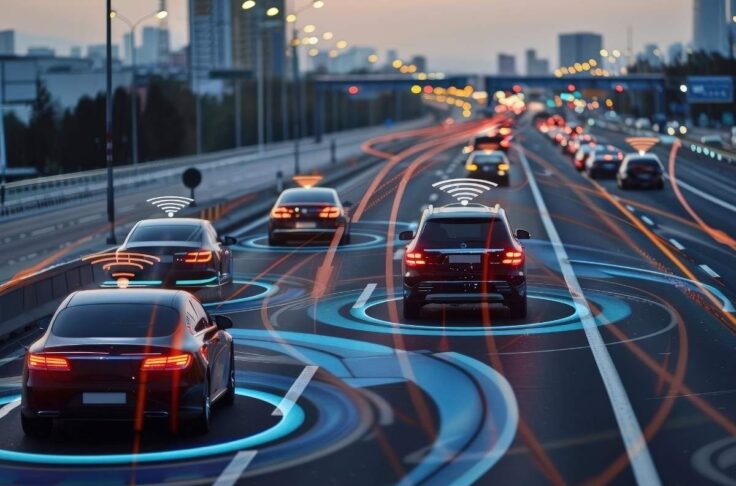
New INVERS Mobility Barometer finding: 50,000 vehicles in free-floating car sharing across Europe

Car on demand – in many European metropolises, the spontaneous use of freely available car-sharing vehicles is part of the established mobility offer. The current INVERS Mobility Barometer analyzes this specific market for the first time. Its five key findings:
- (1) Strong market concentration: 70 percent of Europe’s free-floating car fleet is in just five countries.
- (2) Dynamic market characterized by acquisitions and the quest for profitability.
- (3) Boundaries between business models becoming more fluid.
- (4) Car sharing drives e-mobility.
- (5) Data-driven and AI-based solutions optimize business processes.
Siegen, May 4th, 2023 – The new edition of the Invers Mobility Barometer provides a comprehensive overview of the European free-floating carsharing market for the first time. In free-floating carsharing or flexible carsharing, fleet operators offer their vehicles within a defined business area, where users can find available vehicles via smartphone and end the rental at any suitable parking space within the business area. For the current barometer, the research team scrutinized public data from more than 90 carsharing operators in 29 countries, summarized relevant market studies and interviewed selected international experts. “It was only with the widespread use of smartphones that free-floating carsharing gained momentum as a business model and then established itself in many European countries at varying speeds,” explains Enrico Howe, Senior Market Researcher at Invers. “In 2008, Daimler launched Car2Go, the first major service in Germany, followed in 2011 by BMW’s DriveNow, another pioneer. In Milan, the first service launched in 2013 and in Poland not until 2016.” The current Mobility Barometer compiles data and trends in Europe comprehensively for the first time.
-
Strong market concentration: 70 percent of the European free-floating fleet is in five countries.
By far the largest European market for free-floating carsharing is Germany, with 18,500 vehicles in 34 cities. In the overall European picture, this means that more than a third of the European free-floating carsharing fleet is on German roads. Gunnar Nehrke, executive director of the Bundesverband CarSharing and author of an annual Germany-wide carsharing study, attributes this to the testing strategy of car manufacturers. “I do not think that Germany is a special place for free-floating carsharing. I think the strong position of free-floating carsharing in Germany is more related to the fact that car manufacturers tested this carsharing business model here before expanding to other countries.” Poland, with about 5,500 cars, and Italy, with 5,400 cars, each accounting for about 10 percent of Europe’s free-floating fleet, come in second and third, respectively, according to national association studies. Spain is fourth with about 3,500 to 4,000 cars, and France is fifth with about 2,300 vehicles. Other large free-floating fleets are found in Austria, Belgium, Hungary, the Netherlands and the UK. In countries such as Ireland, Switzerland and Norway, on the other hand, there are currently no free-floating carsharing services offered.
-
Dynamic market characterized by acquisitions and the quest for profitability.
In the still relatively young market, the most important goal for many operators is to become profitable. This is evident in almost all the expert interviews in the Mobility Barometer. In addition, the market has seen a lot of momentum recently, particularly through acquisitions. At the end of 2021, GreenMobility acquired Dutch provider Fetch Mobility. Stellantis integrated Share Now into its own Free2move brand in 2022. In November 2022, Miles acquired the WeShare free-floating fleet from Volkswagen and is now the largest carsharing provider in Germany.
-
The boundaries between business models are becoming increasingly fluid: operators are using vehicles flexibly in sharing, subscription models, or traditional rentals.
Another clear trend is the combination of different business models: free-floating operator MILES, for example, also offers car subscriptions, while Share Now in Münster has added station-based car sharing as a supplement to its core free-floating business. In Germany, some providers of station-based car sharing took the opposite approach by integrating free-floating. These include cambio, stadtmobil, teilAuto, and book-n-drive. One example of multimodal service expansion is Bolt.Drive. The ridesharing and kick scooter sharing provider expanded into car sharing in 2021. Sixt Share, on the other hand, uses synergies with the traditional rental business for its car-sharing offering.
-
Car sharing drives e-mobility: small and medium-sized operators are often 100 percent electric.
In Germany, for example, more than 20 percent of the total carsharing fleet is comprised of e-cars, while only 3.3 percent of the total number of vehicles registered in Germany are electric. In addition, numerous operators have e-vehicles exclusively in their fleets, such as GreenMobility in Denmark, Belgium, the Netherlands and Finland, Aimo Share in Sweden, Voltio in Spain, e-GO! DRIVALIA in Italy or Eloop in Austria. “When it comes to sustainability, we can point to the growth of the share of electric vehicles in Italian car sharing,” says Luca Refrigeri, data analyst for the Italian association Osservatorio Nazionale della sharing mobility. “The share was back above 25 percent in 2021. In addition, the number of micro-cars in fleets has increased significantly.” In Hamburg, car-sharing companies Miles, ShareNow, Sixt and WeShare have agreed to increase the share of electric vehicles in their fleets to at least 80 percent by the turn of 2023/24.
-
Data-based and AI-based solutions optimize business processes and offer new application possibilities.
On the road to profitability, operators are increasingly turning to detailed vehicle data and innovative technologies. For example, AI-driven, real-time damage detection solutions can significantly optimize damage management processes and reduce revenue losses by up to 10 percent.
The Invers Mobility Barometer Vol 2 “European Free-Floating Carsharing” can be found here.
About Invers
Invers, inventor of automated vehicle sharing, enables mobility service providers to launch, operate and scale their offerings with integrated hardware and software solutions specifically designed for developers of shared mobility services. As the world’s first shared mobility technology company, Invers is developing and reliably maintaining the fundamental building blocks at scale to offer its customers cost-efficient and easily implementable tech solutions.
The company acts as an independent and reliable partner for operators of services such as car sharing, scooter sharing, ride pooling and car rental with the vision to make the use of shared vehicles more convenient and affordable than ownership. Customers include Share Now, Clevershuttle, Miles, imove, Carify, Getaround, imove, Flinkster, TIER and Emmy. The company was founded in 1993 and has locations in Siegen, Cologne and Vancouver. The development takes place entirely in Germany.


